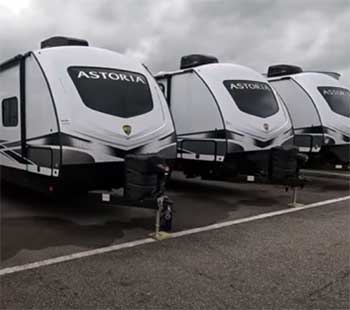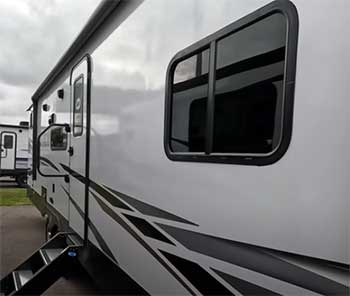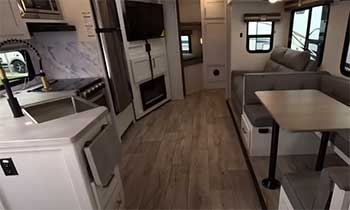The Dutchmen Astoria is a popular fifth wheel RV manufactured by Thor Industries. Like any RV, the Astoria is prone to some issues that owners should be aware of.
In this comprehensive guide, we’ll outline the most common Dutchmen Astoria problems, explain what causes them, and provide potential solutions.
Most Common Dutchmen Astoria Problems
Now that we know why RVs like the Astoria tend to have issues, let’s look at the most reported problems with this specific model.
1. Water Leaks

Water leaks are probably the most prevalent issue with any RV, including Dutchmen models. Common culprits include:
- Faulty seals around windows, doors, slide-outs, vents, etc.
- Cracked welds and seams on exterior shell.
- Plumbing leaks from fittings, pipes, water heater, etc.
- Improper diverters and drainage allowing water intrusion.
- Roof damage causing openings.
Water leaks can cause serious damage if left unchecked. Wet insulation loses R-value. Rotting, mold, and mildew can occur. Make sure to inspect seals regularly, watch for damp areas, and address any leaks immediately.
2. Electrical Shorts and Faults
With the extensive 12V and 120V electrical systems on RVs, problems are bound to arise. On Astorias, look for:
- Faulty wiring connections causing shorts.
- Breakers tripping from overloads.
- Lights flickering from loose/damaged wires.
- Accessory failures from low voltage.
- Damage to converters, inverters, and distribution panels.
Many electrical issues can be prevented with proper maintenance. Check wires for rubbing, cracking, and corrosion. Upgrade undersized wires. Clean and tighten connections.
3. RV Refrigerator Problems
RV refrigerator issues seem to plague most brands, including Dutchmen. Common problems include:

- Cooling unit failures. These need complete replacement.
- Faulty thermostats and control boards.
- Clogged fridge vents causing overheating.
- Door seal leaks.
- Leveling problems on absorption fridges.
Refrigerators take a beating on the road. Regular cleaning of coils and seals can extend their life. But eventually, the costly cooling unit may need replacement.
4. Slide-Out Issues
Slide-out rooms add a lot of living space, but also more things to go wrong:
- Misaligned slide-outs causing bind and wear.
- Broken/detached slide components and hardware.
- Hydraulic and motor failures on power slides.
- Leaks/damage where slide-outs meet the main seals.
- Frozen slide rails requiring lubrication.
Ensure proper slide alignment and avoid forcing stuck slides. Keep seals and rails lubricated. Check hydraulic fluid and connections.
5. Propane System Problems
Propane leaks and appliance issues are also common, including:
- Leaking propane lines, valves, fittings, tanks. (Use bubble test and sniff test!)
- Inoperative regulators and sensors.
- Burner/pilot light problems on appliances.
- Flame lifting, blowing out, or poor adjustment.
- Carbon monoxide alarms triggering.
Do regular inspections for leaks with leak detector fluid. Ensure propane tanks are secure. Keep detectors working properly.
6. Furnace Failures
RV furnaces work hard, especially in colder climates. Two major issues arise:
- Circuit board/igniter failures. The circuitry is delicate.
- Cracked heat exchangers. This requires full furnace replacement.
Have furnaces inspected annually before winter. Replace filters and clean routinely. Small repairs can prevent total breakdowns.
7. Roof Deterioration
The roof takes a beating from sun, rain, snow, wind, and road debris. Seal failures, cracks, and leaks are common on Dutchmen units. Inspect closely for:
- Cracked rubber roof material. Can be patched but full replacement is best.
- Dried, cracked, or missing caulk around vents/seams. Needs fresh sealant.
- Damaged fiberglass sidewalls and caps. Can be repaired with epoxy.
- Missing or loose screws attaching caps. Allow water intrusion.
A well maintained roof can last 10-15 years. Poorly maintained roofs leak within 5 years. Do frequent inspections and resealing.
8. Axle and Running Gear Wear
The axles, springs, tires, and other chassis components bear the literal weight of the RV. Some issues to look for:

- Cracked springs. These require immediate replacement.
- Loose lug nuts causing wheel wobbling.
- Excess tire cupping, wearing, and dry rot.
- Failed wheel bearings from lack of lubrication.
- Shifting during towing indicating worn suspension parts.
- Brake wear causing poor stopping and chatter.
Keep tires inflated properly and replaced as needed. Follow lug nut torque specs. Have brakes and bearings serviced annually.
9. Air Conditioner Failures
Keeping cool in summer is a must. But RV ACs work overtime and struggle with:
- Compressor breakdowns. Requires complete AC unit replacement.
- Fan motors overheating and burning out.
- Faulty control boards and thermostats.
- Refrigerant leaks causing reduced cooling.
- Unit corrosion and fit issues on roof.
Clean intake filters regularly. Have yearly AC maintenance done to extend the life. Watch for refrigerant leaks.
10. Generator Problems
Onboard generators provide power when shoreline electric is unavailable. But they can be finicky:
- Hard starting or not starting at all in cold weather.
- Surging and fluctuating output voltage.
- Overheating and smoke from lack of maintenance.
- Fuel leaks making a mess and causing fire risk.
- Excessive noise/vibration.
Change oil, filters, and plugs as specified. Inspect fuel lines for any leaks. Keep intake louvers clean. Consider adding a battery warmer for cold starting.
Also Read: Issues With Dutchmen Kodiak RV.
Why Do Dutchmen Astorias Have Problems?
Before diving into the specific issues, it helps to understand why Dutchmen Astoria RVs are susceptible to problems in the first place. There are a few key factors at play:
- Complex Systems
Modern RVs like the Astoria are complex vehicles with electrical, plumbing, propane, and appliance systems integrated together. With so many components interacting, there are more possibilities for something to go wrong.
- Usage Demands
RVs go through more extreme conditions than a typical home. They deal with long trips, bumpy roads, temperature swings, moisture, and more. This puts added strain on components.
- Budget Limitations
To keep costs down, RVs are made with lightweight and affordable materials that may not hold up over time as well as more heavy duty options. Corners need to be cut somewhere to meet certain price points.
- Lack of Quality Control
With RVs being mass produced quickly, quality control can be hit or miss from the factory. Defective parts or improper installations can occur.
What Causes These Dutchmen Astoria Problems?
Knowing what issues to look for is useful, but understanding what causes them provides more context:
- Component Defects: Some issues arise from defective parts right from manufacturing. RV components are mass produced quickly at the lowest cost. Quality control sometimes fails.
- Improper Installation: Shoddy factory or dealer installations also cause problems if connections aren’t secure, parts are misaligned, or seals are incomplete.
- Poor Ventilation: Lack of airflow causes overheating failures on many RV components. Vents and intakes need to be unobstructed.
- Lack of Maintenance: RVs need regular care and maintenance to keep systems running properly. Lack of maintenance accelerates wear and tear.
- Heavy Usage: The more miles put on an RV, and the more extreme conditions it faces accelerates failures too. RVs face harder use than typical homes.
- Design Flaws: Some issues seem inherent with RV construction techniques. Seals and joints will eventually leak. Roofs degrade over time. Slide-outs always have problems.
Regardless of the reason, it’s important owners understand these common Astoria failures may occur. Stay vigilant on maintenance and fixes to maximize your RV investment.
Tips to Avoid Dutchmen Astoria Problems
Here are some proactive tips to help avoid issues with your Astoria:
- Do a thorough walkthrough inspection regularly looking for any problems. Fix issues immediately before they worsen.
- Follow the maintenance schedule in your owner’s manual. Don’t delay oil changes, lubrication, filter changes, etc.
- Wash the RV often, especially after trips. Removing dirt, road grime, and salt helps prevent corrosion and deterioration.
- Inspect seals around slide-outs, windows, doors, vents, etc. Look for gaps, cracks, or stretches seals. Reseal as needed.
- Check the roof 2-3 times per year. Look for any cracks or damage. Reseal as needed.
- Test smoke, CO, and propane alarms. Replace batteries every 6 months.
- Use high quality RV covers and tire covers when stored. This protects from UV damage and accidental leaks.
- Consider an extended warranty or protection plan for expensive parts like the refrigerator, A/C unit, etc.
No RV is problem-free, but attentive care and maintenance helps minimize issues and cost with Dutchmen models.
Also Read: Grand Design Imagine XLS 17MKE Complaints.
Dutchmen Astoria RV Problem FAQs
Dutchmen produces entry-level to mid-range trailers. They offer a lot of great features for the price. But some manufacturing shortcuts sacrifice longevity. With rigorous maintenance, they can last many years.
The Astoria line offers nice fifth wheels with modern amenities at reasonable prices. They are lighter weight than some competitors. Like with any RV, there can be quality control issues. But overall they offer good value if you stay on top of maintenance.
Thor Industries owns the Dutchmen brand. Dutchmen Astoria RVs are manufactured in multiple Thor factories in Indiana and Oregon. Thor produces many major RV brands like Keystone, Crossroads, etc.
Thor Industries acquired the Dutchmen brand in late 2010 from Brunswick Corporation. This joined Dutchmen with the existing Keystone brand under Thor’s ownership. Thor sought to expand its towable RV portfolio at that time.
Final Thoughts
While Dutchmen Astoria RVs are well-equipped and offer good value, they do have some commonly reported issues to be aware of. Water leaks, electrical problems, appliance breakdowns, slide-out troubles, and roof deterioration are most prevalent.
With proactive maintenance and early repairs, Dutchmen RVs can provide many years and miles of comfortable use. But lack of attention to issues inevitably leads to more costly repairs down the road.
Understand the weak points, follow recommended maintenance diligently, and address problems promptly to get the most enjoyment out of your Astoria.

